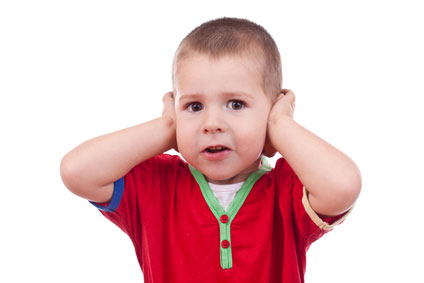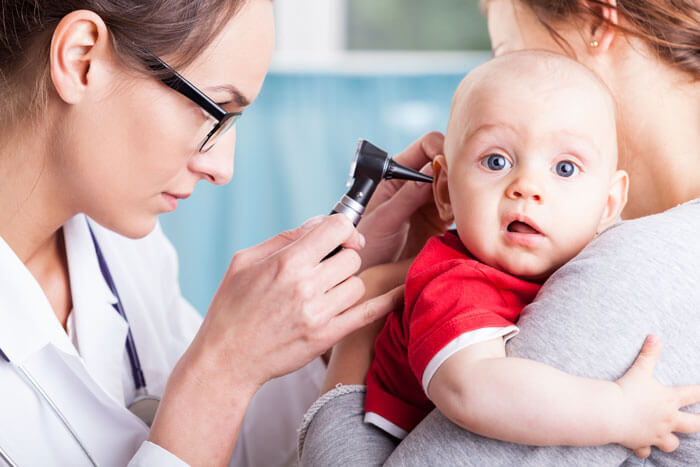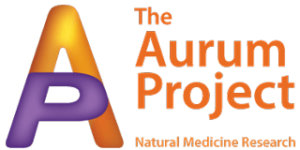What does the evidence say?
Complementary medicine can be used in the treatment of otitis media (aka ear infection). The use of properly prescribed homeopathic medicine (by a registered homeopath) can lead to:
- faster relief
- decreased pain
- quicker resolution of infection, in combination with conventional therapy. (1)
Advantages for homeopathy in otitis media are:
- lower antibiotic fill rates
- less serious side effects
- no drug interactions
- reduced parental leave from work! (2)

Systematic reviews have found:
- Mild treatment effect for homeopathic medicine in otitis media. (3)
- Reduction of antibiotic use. (4)
- Clinical efficacy and effectiveness of homeopathy in acute paediatric infections are favourable in terms of faster responses, fewer and less serious side effects, and cost savings. (5,6)
Two well regarded randomized controlled trials (RCT) showed promising results for homeopathic medicine in the treatment of otitis media with:
- Significant decrease in symptoms of otitis media at 24 and 64 hours after homeopathic treatment. (7)
- Early homeopathic treatment resulted in nil antibiotics in the homeopathy group. (8)
An observational study found pain control in 40% of children after 6 hours, with resolution of all otitis media symptoms being twice as fast with homeopathic medicine (9)

An Aurum Project retrospective case series analysis (10) found significant potential for homeopathic treatment of otitis media and otitis media with effusion (aka glue ear).
A guide to common homeopathic medicines can be found as part of Marom et al., 2016 (3) systematic review (copyright prohibits sharing here).
Avoiding cow’s milk? Systematic review (11) found a cow's milk protein allergy in 11% of children who underwent ENT procedures, in 40% of children with otitis media with effusion, and a higher overall tendency to otitis media.
Since the 1990’s expert opinion has swung against doctors giving antibiotics for otitis media (12) however, in Australia, the highest rate of dispensing antibiotics in under 65’s is for children aged between two and four most commonly for – you guessed it… otitis media (13).
The Royal Australian College of General Practitioners recommend that otitis media in non-indigenous children between the ages of two to twelve years should not be treated with antibiotics unless there are signs of widespread infection. (14)
Four years’ ago antibiotic resistance began to apply to our ‘reserve’ antibiotics (15) but scarily antibiotics are still being overprescribed (in direct contravention of national evidence-based prescribing guidelines) with ever increasing rates of resistant bacteria in our communities. (16)
A 2018 study showed British GP’s using complementary medicine - including homeopathy - prescribed 22% fewer antibiotics. (17)
What causes antibiotic resistance?
This answer is straight from the Australian Government website: The main cause of antibiotic resistance is antibiotic use. When we use antibiotics, some bacteria die but resistant bacteria can survive and even multiply. The overuse of antibiotics makes resistant bacteria more common. The more we use antibiotics, the more chances bacteria have to become resistant to them. This means that antibiotics won’t work when we need them in the future. If we decrease antibiotic use, the antibiotics may again become effective at killing bacteria.
Antibiotic resistance develops naturally in bacteria. However, our actions can increase resistance developing and spreading. This can happen:
- when human and animal health professionals over prescribe antibiotics
- when people don’t take antibiotics as directed
- due to poor hygiene and a lack of infection prevention and control e.g. not washing hands properly
- due to people travelling around the world, spreading resistant bacteria.

_____________________________________________________________
 Thank you to Sarah Penrose for contributing this blog.
Thank you to Sarah Penrose for contributing this blog.
Sarah is an Australasian homeopath and can be contacted at her website goodhealthforgreatlife.com
SARAH PENROSE - BSc (Hons) Homeopathy
Hawkes Bay, New Zealand Registration: NZCH AROH goodhealthforgreatlife.com
______________________________________________________________________
References about Antibiotic resistance, Otitis Media and Homeopathy
(1) Nathan et al., 2022. Complementary/Integrative Medicine for Pediatric Otitis Media. Otolaryngol Clin North Am. Oct;55(5):1055-1075.
(2) Bell and Boyer. 2013. Homeopathic medications as clinical alternatives for symptomatic care of acute otitis media and upper respiratory infections in children. Glob Adv Health Med. Jan;2(1):32-43.
(3) Marom et al., 2016. Complementary and Alternative Medicine Treatment Options for Otitis Media: A Systematic Review. Medicine (Baltimore). Feb;95(6):e2695.
(4) Fixsen. 2013. Should homeopathy be considered as part of a treatment strategy for otitis media with effusion in children? Homeopathy. Apr;102(2):145-50.
(5) Bellavite et al., 2011. Advances in homeopathy and immunology: a review of clinical research. Front Biosci (Schol Ed). Jun 1;3(4):1363-89.
(6) Bukutu et al., 2008. Complementary, holistic, and integrative medicine: therapies for acute otitis media. Pediatr Rev. Jun;29(6):193-9.
(7) Jacobs J, Springer DA, Crothers D. 2001. Homeopathic treatment of acute otitis media in children: a preliminary randomized placebo-controlled trial. Pediatric Infectious Diseases Journal [online]. Feb;20(2):177-83.
(8) Sinha et al., 2012. Randomized controlled pilot study to compare Homeopathy and Conventional therapy in Acute Otitis Media. Homeopathy. 2012 Jan;101(1):5-12.
(9) Frei & Thurneysen. 2001. Homeopathy in acute otitis media in children: treatment effect or spontaneous resolution? Br Homeopath J. Oct;90(4):180-2.
(10) Baron & Jordan, 2014. Analysis of a Modern Approach to the Homoeopathic Treatment of Chronic and Acute Ear Problems in Children. Journal of The Australian Traditional Medicine Society. 20; 3. Meadowbank, New South Wales. The Australian Traditional Medicine Society.
(11) Oliveira et al., 2022. Correlation between cow's milk protein allergy and otitis media: a systematic review. Braz J Otorhinolaryngol. 2022 Sep-Oct;88(5):803-811.
(12) https://www.abc.net.au/health/thepulse/stories/2011/04/06/3183024.htm
(13) https://www.safetyandquality.gov.au/publications-and-resources/resource-library/aura-2019-third-australian-report-antimicrobial-use-and-resistance-human-health
(14) https://www.healthdirect.gov.au/ear-infection
(15) https://www.nps.org.au/news/antibiotic-resistance-in-australia-here-and-now
(16) https://www.safetyandquality.gov.au/our-work/antimicrobial-resistance/antimicrobial-use-and-resistance-australia-surveillance-system/aura-2021
(17) van der Werf et al., 2018. Do NHS GP surgeries employing GPs additionally trained in integrative or complementary medicine have lower antibiotic prescribing rates? Retrospective cross-sectional analysis of national primary care prescribing data in England in 2016. BMJ Open. Mar 5;8(3):e020488.
